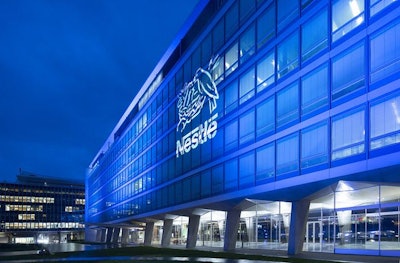
An announcement by Switzerland-based global food giant Nestlé that it is to launch its first “plant based burger” in Europe and the U.S. has triggered new pressure to prevent misleading food labeling of meat substitutes.
In what the firm calls “its biggest move into the meat-free market,” Nestlé has this week announced its imminent launch of a cook-from-raw plant-based burger in selected European countries starting this month, followed by the U.S. later in the year.
Under its “Garden Gourmet” brand, the 100-percent plant based “Incredible Burger” will be gradually rolled out across Belgium, Denmark, Finland, Germany, the Netherlands, Norway, and Sweden, starting in April 2019.
The product contain protein from soy and wheat, and extracts of beetroot, carrot, and bell pepper to “help create the look of a beef burger before, during and after cooking,” the company says. It will be available in chilled and frozen forms.
Starting in the fall, Nestlé plans to unveil a similar product in the U.S. Modified to suit American tastes, it will be sold fresh, as the “Awesome Burger” under the “Sweet Earth” brand.
“These new burgers don’t compromise on flavor, texture and cooking experience,” said Wayne England, head of the firm’s food business. “They underline Nestlé’s increased focus on tasty, authentic plant-based food. We believe this trend is here to stay, as consumers look at different ways to enjoy and balance their protein intake and lower the environmental footprint of their diets.”
When is a burger not a burger?
With the development and launch of more non-meat products, the use of terms such as “burger” and “sausage” has been receiving media and regulatory attention — whether the foods are made from plant-based products or cell-grown meats.
It is interesting to note that France and the United Kingdom (U.K.) are not included in Nestlé’s initial launch plans for its plant-based product. This may be because the use of terms such as “burgers” for vegan or vegetarian products are particularly controversial in those countries.
French Members of Parliament (MPs) voted in April of 2018 to stop vegetarian products from being labeled in the same way as traditional meat or milk products, reported The Telegraph.
For the European Union, the European Court of Justice ruled in June 2017 that dairy-related words could only be used for products made from milk, according to the USDA Foreign Agricultural Service.
A recent survey of almost 1,000 consumers in the U.K. and the U.S. revealed that 25 percent of all the respondents thought manufacturers should not be allowed to use meat-related descriptions for their of vegetarian products.
While the sub-group of vegetarians asked was less likely to disapprove of the meat-related words, vegans were more opposed to such terms as they reject any product that resembles meat, according to the survey conducted by Surveygoo on behalf of Ingredient Communications.
In March this year, two of the regulatory agencies in the U.S.— the USDA Food Safety and Inspection Service (FSIS), and the Department of Health and Human Services’ Food and Drug Administration (FDA) — formally agreed to oversee jointly the production of human foods derived from the cells of livestock and poultry.
“This shared regulatory approach will ensure that cell-cultured products derived from the cell lines of livestock and poultry are produced safely and are accurately labeled,” the agencies commented in a statement.
The agreement was welcomed by the North American Meat Institute.
Meat products are not the only food category for which manufacturers have been developing plant-based alternatives.
The largest egg producer in South America, Mantiqueira, has debuted its egg substitute at a recent food trade show in Brazil. The pea starch and plant protein product is marketed in packaging very similar to a conventional egg box.

















